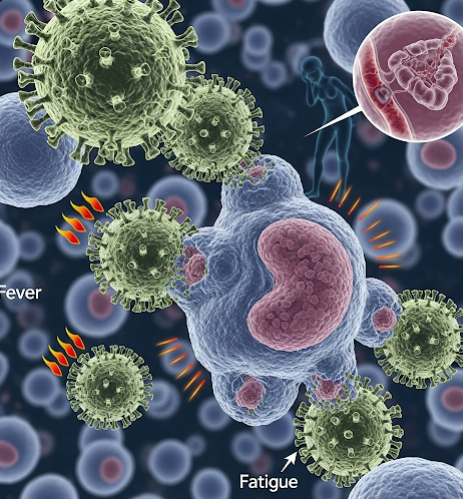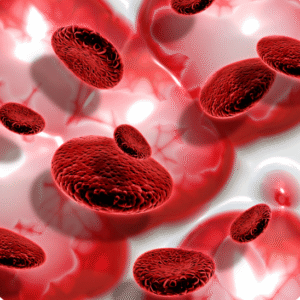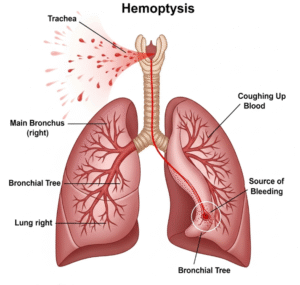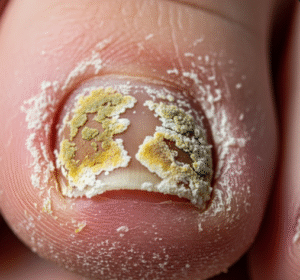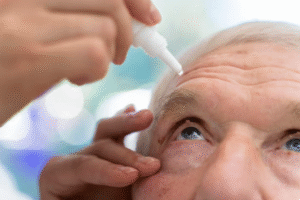Overview
Infectious mononucleosis, commonly known as “mono” or the “kissing disease,” is an acute viral infection caused primarily by the Epstein-Barr virus (EBV). It mainly affects adolescents and young adults but can occur at any age. The disease is characterized by fever, sore throat, swollen lymph nodes, and fatigue. In Korea, infectious mononucleosis is diagnosed through clinical evaluation and blood tests, with supportive care being the mainstay of treatment. Awareness and early diagnosis help prevent complications and reduce transmission.
What Is Infectious Mononucleosis?
Infectious mononucleosis is a contagious illness caused by EBV, a member of the herpesvirus family. The virus spreads mainly through saliva, hence the nickname “kissing disease,” but it can also be transmitted through other bodily fluids like blood and semen. After infection, EBV remains dormant in the body’s B lymphocytes for life. Most cases are mild, but symptoms can last several weeks, and complications, though rare, can be serious.
Symptoms
- Persistent fatigue and malaise
- Sore throat, often severe with tonsillar swelling and white exudates
- Fever, sometimes high and prolonged
- Swollen and tender lymph nodes, especially in the neck and armpits
- Enlarged spleen (splenomegaly) and sometimes liver enlargement
- Headache and muscle aches
- Rash, which may appear especially if certain antibiotics are given
- Loss of appetite and general weakness
Causes
The causative agent of infectious mononucleosis is the Epstein-Barr virus, transmitted primarily through saliva. After entering the body, EBV infects epithelial cells in the throat and B lymphocytes. The immune response to this infection causes the characteristic symptoms. Close personal contact, sharing utensils, or exposure to coughs and sneezes increases the risk of transmission.
Risk Factors
- Adolescents and young adults, particularly ages 15-24
- Close contact with infected individuals (e.g., through kissing, sharing drinks)
- Living in close quarters such as dormitories or military barracks
- Weakened immune system due to illness or medications
Complications
- Splenic rupture, a rare but potentially life-threatening condition due to an enlarged spleen
- Hepatitis causing liver inflammation and jaundice
- Airway obstruction from severe tonsillar swelling
- Hemolytic anemia or thrombocytopenia (low blood cell counts)
- Neurological complications such as meningitis or Guillain-Barré syndrome (rare)
Prevention
- Avoiding sharing utensils, drinks, or close contact with infected individuals
- Practicing good hygiene, including regular handwashing
- Avoiding kissing or close personal contact during active infection
- No vaccine currently available for EBV or infectious mononucleosis
Treatment Options in Korea
Treatment for infectious mononucleosis is primarily supportive as there is no specific antiviral therapy approved for EBV infection:
- Symptomatic Care:
- Rest and adequate hydration
- Over-the-counter pain relievers and fever reducers such as acetaminophen or ibuprofen
- Throat lozenges or sprays to soothe sore throat
- Monitoring and Management of Complications:
- Regular monitoring for spleen enlargement and avoidance of contact sports to prevent rupture
- Hospitalization if severe complications like airway obstruction or neurological symptoms occur
- Medical Advice:
- Avoiding antibiotics like ampicillin or amoxicillin unless bacterial infection is confirmed, as these can cause rash in mono patients
- Educating patients on gradual return to physical activities
Korean healthcare centers emphasize early diagnosis, patient education, and follow-up care to ensure complete recovery and minimize risks.

